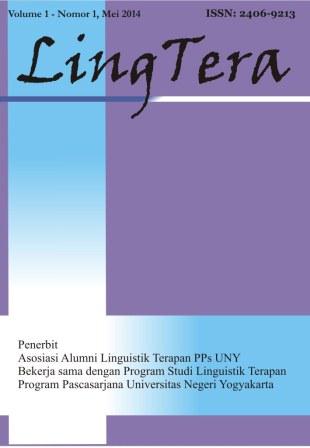An analysis of syntactical errors made by eleventh grade students of madrasah aliyah negeri
DOI:
https://doi.org/10.21831/lt.v4i2.6162Keywords:
errors, syntactical, omission, addition, mis-formation, mis-ordering, mis-selection, interlingual, intralingualAbstract
The aim of this research is to describe: (1) the types of syntactical errors and (2) the possible causes of the syntactical errors in the sentences found in analytical exposition texts made by the eleventh grade students of MAN Wonokromo in the academic year of 2014/2015. The research was a descriptive study. The data sources were 30 texts made by 30 of eleventh grade students of the school. The data were collected by using writing tests. The results of the study show there are five types of syntactical errors and two causes of syntactical errors. The types of the syntactical errors are (1) omission (32.46%), (2) mis-formation (22.72%), (3) mis-selection (22.41%), (4) addition (17%), and (5) mis-ordering (5.41%). The causes of the students' syntactical errors are (1) intralingual and developmental errors (53.67%) and (2) interlingual (46.33%). Finally, the results imply that both teachers and students must see errors as the key in understanding and solving the syntactical errors in English writing lesson.
Downloads
Published
How to Cite
Issue
Section
Citation Check
License
LingTera allows readers to read, download, copy, distribute, print, search, or link to its articles' full texts and allows readers to use them for any other lawful purpose. The journal allows the author(s) to hold the copyright without restrictions. Finally, the journal allows the author(s) to retain publishing rights without restrictions.
- Authors are allowed to archive their submitted articles in an open-access repository.
- Authors are allowed to archive the final published article in an open-access repository with an acknowledgment of its initial publication in this journal.

Psychology, Evaluation, and Technology in Educational Research is licensed under a Creative Commons Attribution-ShareAlike 4.0 International License.
Based on a work at https://petier.org/index.php/PETIER.










